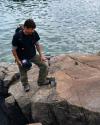Muckleshoot Tribal Historian Warren KingGeorge paddles the s.dəxʷìł (hunting canoe) in the Green River (Photo by Sven Haakanson)
ARCHY 469, Spring 2022
Monday and Wednesday 9:30 AM -11:20 PM
Sven Haakanson and Peter Lape
What is this class about?
Boats are human inventions that allowed some of the most incredible migrations in our history. They contain histories of technology, adaptation and people's lives. How do we analyze and document boats to give us access to these histories? What can boats tell us? How do we care for them? How do we share the knowledge and stories they contain?
Using the Burke Museum's large and diverse collection of traditional dugout and skin boats (both full size and models) from the cold waters of the Pacific Northwest to the warmer waters of the tropical Pacific and Southeast Asia, we will learn to document and preserve many different types of boats. We hope to have visits to the class by guest experts from Pacific Islander and local Coast Salish communities. This is a hands-on, in-person class. Students will learn how to record boat shapes and construction details, build boat models and use tools, and learn photography and video skills. Students will have opportunities to paddle and sail traditional boats from different parts of the Pacific Rim. We will explore connections between contemporary boat building and use with archaeological information about voyaging, migrations, trade, fishing and marine mammal hunting.
Where does the class meet?
We will meet in the East Classroom at the fabulous new Burke Museum. To get there, enter the main public entry door next to Off the Rez Cafe. Then go down the main stairs to the left of the store and admissions desk (no need to check in) under the whale skeleton. The East Classroom is behind the stairs.
Note: The Museum is closed to the public on Mondays, so please wait outside the main entrance and one of us will let you in.
We will also visit the Burke Museum's off site warehouse (transportation provided), where many full-size boats are stored, and also at the Waterfront Activities center and ASUW Shell House for on-water experiences.
Another note: There will likely be some changes to this syllabus during the quarter to accommodate our many guest speakers. However, dates for major assignments will not change.
Meet your instructors:
Sven Haakanson:
I am a Curator of North American Anthropology the Burke and an Ethnoarchaeologist. I research museum collections to learn about Sugpiat objects and then work to repatriate this knowledge through hands on learning at UW and to my tribe on Kodiak Island, Alaska. My last project, we built a 25 foot traditional Angyaaq, an open boat, in the Burke Gallery. We learned how build it from a model in the Burke collection. I grew up on Kodiak Island and spent over 20 years commercial salmon fishing near the village of Old Harbor. I enjoy working on boats and kayaks.
Peter Lape:
I am an archaeologist and Curator of Archaeology at the Burke. My research is focused on Island Southeast Asia, where I am currently exploring the transition to agriculture on small tropical islands starting about 4,000 years ago. Before I became an archaeologist, I wanted to be a boatbuilder, and still work on building and restoring traditional boats as a hobby. I also love sailing and kayaking and have taken boat trips in many parts of the world.
What can you learn in this class?
- Figure out the strange and wonderful ways anthropologists and archaeologists see the world around them,
- use that perspective to delve into the ways humans interact with and think about material objects,
- and apply your new anthropological and archaeological understanding of boat technology to explore questions of human history and adaptation
What are the assignments and how are grades calculated?
This is a hands-on and discussion oriented course with minimal instructor lectures. For this to work, we all need to do the assigned reading on time and be prepared to participate in enthusiastic talking, questioning and trying new and unfamiliar skills when we meet as a group.
We will figure out what grade to give you at the end of the quarter using this breakdown:
- 20% reading and field trip response assignments
- 40% hands-on projects and reports
- 40% final project
What are the rules and policies?
- Our class will follow Burke Museum mask policies while we are in that building, and general UW policies when at other campus locations.
- If you are feeling ill, do not come to class. Get in touch with one of us and we'll figure out ways you can keep up with the class
- Late submissions will not be accepted unless you make alternate arrangements prior to the due date. Get those assignments in on time or accept the consequences.
- We welcome ongoing feedback about the class. Please feel free to send suggestions for improvement at any time during the quarter.
- You are expected to produce your own work in this class. Plagiarism or any other form of cheating will not be tolerated. There won't really be any good opportunities to cheat, actually. All students are expected to uphold the University of Washington standard of student conduct.
- We are committed to meeting the needs of all class participants. The Disabled Student Services (DSS) Office coordinates academic accommodations for enrolled students, University staff, and academic personnel with documented disabilities. We are happy to discuss ways of expanding access to this class that are not only mandated by law.
- College can be a difficult time. The UW has comprehensive Counseling and Mental Health Services, including individual and group counseling as well as 24/7 counseling and crisis support through My SSP.
- Washington state law requires that UW develop a policy for accommodation of student absences or significant hardship due to reasons of faith or conscience, or for organized religious activities. The UW’s policy, including more information about how to request an accommodation, is available at Religious Accommodations Policy. Accommodations must be requested within the first two weeks of this course using the Religious Accommodations Request form.

